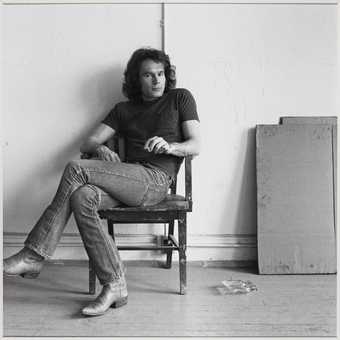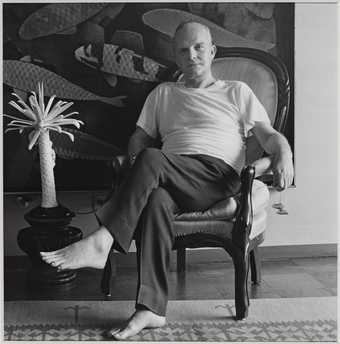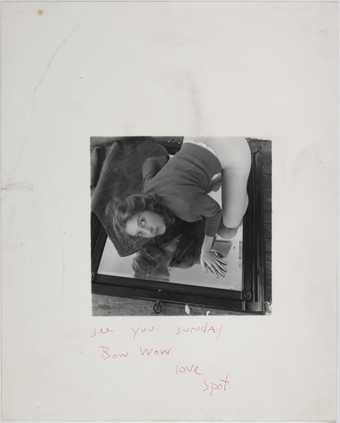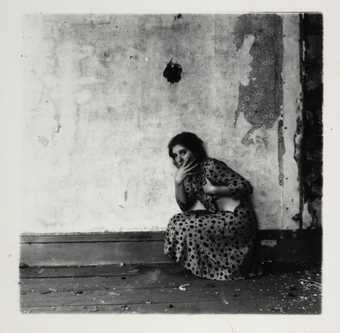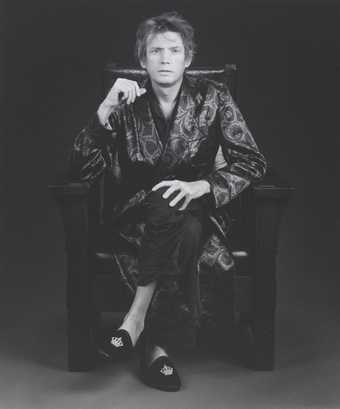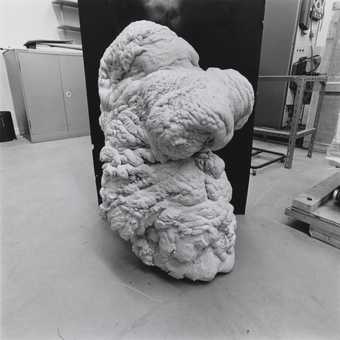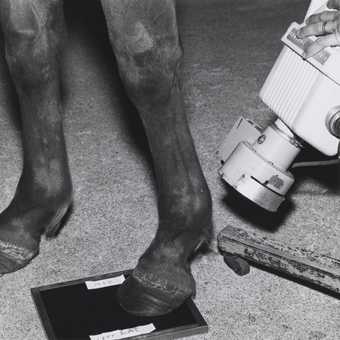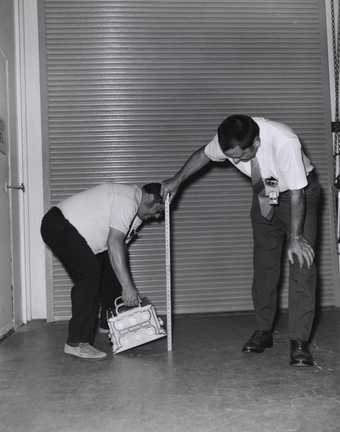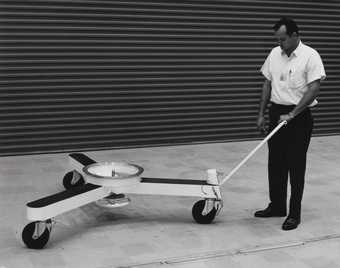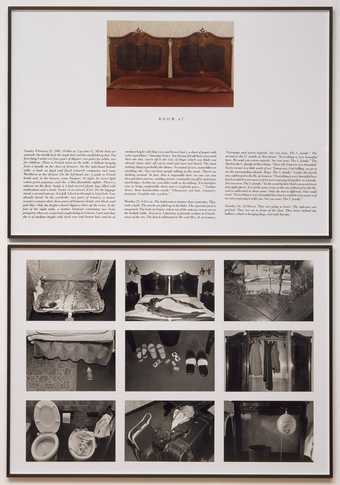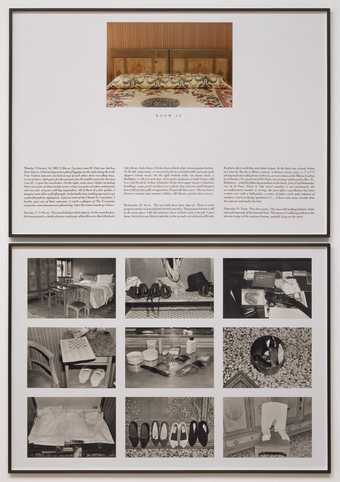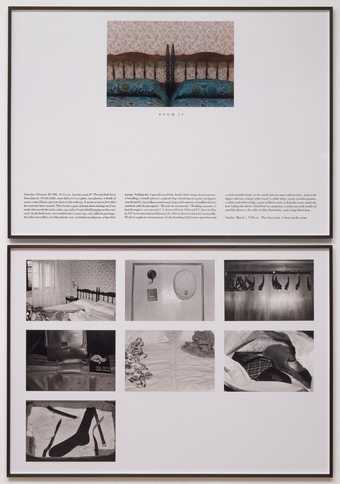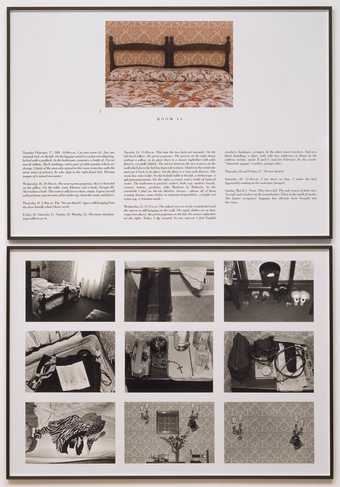
Not on display
- Artist
- Vito Acconci 1940–2017
- Medium
- 2 photographs, gelatin silver print, on paper and 10 works on paper, ink
- Dimensions
- Support, secondary: 940 × 700 mm
frame: 963 × 723 × 32 mm - Collection
- Tate
- Acquisition
- Presented by Barbara Gladstone 2001
- Reference
- P11775
Summary
The two panels that compose Room Situation, 1970, document an activity of the same year entitled Room Piece, which had been performed by the artist over three January weekends. On each weekend the artist would take the movable contents of a section of his downtown New York apartment to the Gain Ground Gallery, which was eighty blocks away, then return to the gallery to fetch any items he needed, only to take them back again when he had finished using them. On the first weekend (10-11 January 1970), the items taken to Gain Ground were those from Acconci's kitchen, on the second (17-18 January) those from his living room, bedroom and bathroom, while on the third (24-25 January) it was the turn of articles from his workroom. As critic Kate Linker has written, 'personal property was thereby conveyed to a publicly visible arena, defined as a kind of extended apartment, employing the city transportation system for access.' (Kate Linker, Vito Acconci, New York 1994, p.20.)
The first, smaller, panel is composed of two black and white photographs on paper - which depict objects from the artist's kitchen (including a table and two chairs, a broom and several full cardboard boxes) and the artist removing a jar of coffee from a box respectively - and a typewritten text on ledger paper which explains the workings of the performance and how the artist could continue his daily activities in his apartment: 'whenever I need something stored at Gain Ground, I will go there to pick it up and bring it back home; when I finish with it, it is returned to the gallery'.
Nine ledger papers are assembled onto the second panel in three rows of three pages each. Mostly hand-written in fibre-tipped pen under typewritten headings, they document the daily comings and goings of the artist, which items he borrowed and for how long. The entries describe items needed, timings, methods of transport and routes taken. A typical entry describes how on 17 January the artist, needing blankets and a pillow, left his apartment at 12:20 and reached the gallery (partly on foot, partly by subway) at 1:05 in the morning. He picked up the items and returned to his apartment by the same means, arriving there at 1:43. The following morning he went back to the gallery by car at 8:30, getting there and returning the items at 8:55.
An important conceptual artist, Vito Acconci explores the relationship between the human body and self and social and psychological conditions through his performances (which he called 'activities') and installations. The two-part Room Situation features the classic conceptualist combination of photograph, descriptive text and quasi-scientific listing and diagram. Room Situation blurs the distinction between home and gallery, between the private and public activities of the artist. As in all of Acconci's early works, the actual physical manifestation of the work of art is secondary to the artist's documented performative action. Room Situation is also an early example of institutional critique, questioning the detaching sanctity of the gallery space, the nature of the art object and the social and geographical separation of the art world.
Further reading:
Vito Acconci, exhibition catalogue, Stedelijk Museum, Amsterdam 1978, reproduced in part p.11
Kate Linker, Vito Acconci, Rizzoli, New York 1994, reproduced in part p.21
Giorgia Bottinelli
February 2002
Does this text contain inaccurate information or language that you feel we should improve or change? We would like to hear from you.
Display caption
Gallery label, September 2004
Does this text contain inaccurate information or language that you feel we should improve or change? We would like to hear from you.
Explore
- abstraction(8,615)
-
- non-representational(6,161)
-
- text(1,043)
- formal qualities(12,454)
-
- classification(114)
- photographic(4,673)
- public and municipal(956)
-
- art gallery(245)
- furnishings(3,081)
-
- chair(915)
- box(186)
- actions: postures and motions(9,111)
-
- crouching(276)
- man(10,453)
- self-portraits(888)
You might like
-
Robert Mapplethorpe Brice Marden
1976 -
Robert Mapplethorpe Truman Capote
1981 -
Francesca Woodman Untitled, Providence, Rhode Island
1975–6 -
Francesca Woodman Untitled, from Polka Dots Series, Providence, Rhode Island
1976 -
Robert Mapplethorpe Self Portrait
1988 -
Keith Arnatt I Have Decided to Go to the Tate Gallery Next Friday
1971 -
Larry Sultan, Mike Mandel Untitled
1977, printed 2001 -
Larry Sultan, Mike Mandel Untitled
1977, printed 2001 -
Larry Sultan, Mike Mandel Untitled
1977, printed 2001 -
Larry Sultan, Mike Mandel Untitled
1977, printed 2001 -
Larry Sultan, Mike Mandel Untitled
1977, printed 2001 -
Sophie Calle The Hotel, Room 47
1981 -
Sophie Calle The Hotel, Room 28
1981 -
Sophie Calle The Hotel, Room 29
1981 -
Sophie Calle The Hotel, Room 44
1981

